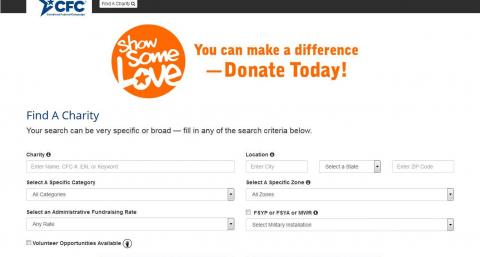
Now is the time to review your CFC description
As CFC charities are getting their 2025 campaign acceptances, now is the time to look closely at your CFC description. You can change your description when you pay the CFC’s “listing fee,” after you receive your acceptance.
In the past, you wanted to write as compelling a case as you could about your work and why it’s important…in 25 words.
Now, in the CFC’s new digital age, you want a compelling case and effective search words. You want to optimize your CFC description for the CFC’s new search engine – SEO for the CFC.
Now at least you get up to 256 characters, or roughly 40 words.
Why is this important?
In 2022, 95% of CFC dollars were given online. Employees can still give using paper pledge cards, but the printed charity catalogs that used to be distributed are no longer printed. Most donors go to the CFC website to make their pledges. To find charities to support, they click on "Find a Charity."
When donors search for a charity, the CFC database includes your charity’s name and 256-character description. Does this collection of words and phrases include common searches that would lead people to your charity?
How do people find you online? Which search terms do they use? That’s what you want in your name and description.
If your charity has digital specialists, this is easy: call in reinforcements. If your charity doesn’t, think about how you would search for a charity doing what your charity does.
Is it “Christian charity?” Or “charity helping Haiti.” Or “charity working in Africa,” or "Ukraine."
Is it “Alzheimer’s research?” Or maybe it’s also “Alzheimer’s Disease research.” The CFC search engine is not Google: the lack of “Alzheimer’s Disease” in your name or description can make a difference in which charities come up.
Often it’s important to be topical. In 2022, a huge flow of giving went to help with the humanitarian crisis in Ukraine. But when a CFC donor searched on "Ukraine" in 2022, only 11 charities came up. Many charities that did a lot to help Ukrainian refugees did not come up in this search. As a result, a relatively new and small charity, United Help Ukraine, got an amazing amount of support: more than $215,000.
In 2020 and 2021, key words would have been "pandemic," "covid" or "coronavirus.
This is tricky, which is why it needs some focus. Talk with other staff, volunteers or family members about how they would do a search that might lead them to find your charity.
Most important: play around with the CFC’s search engine. See if your charity comes up when you enter possible search terms.
If you come up, which other charities come up with you? If you don’t, which charities do come up? You’ll find the reason you don’t come up by focusing on those charities’ names and descriptions.
How do people refer to your charity? Maybe is “LDEF” for the NAACP Legal Defense and Education Fund. For American Civil Liberties Union, it’s “ACLU.” If people use your acronym, use it in your name or description. But this too can be tricky. One of the largest CFC recipients is a local charity in DC, SOME. Originally its name was So Others Might Eat. But it no longer uses that name. But still many people in DC think of it as So Others Might Eat. If you search on this name, SOME doesn't come up.
Another example: the large international charity, CARE. It too no longer uses its original name. When you did a search on "CARE" in 2022, a very common word in the charity world, CARE doesn't come up on the first several page of search results.
Some charities have very long names in the CFC, using both their DBA names for the CFC as well as their legal names, such as “Cancer Prevention and Aid Institute (Cervical Cancer Prevention and Assistance).” One advantage in using both names: if someone searches on “Cervical Cancer,” this charity will come up.
Given the uncertainties of search, when you ask your past CFC donors to support your work again, urge them to use your CFC number or at least your exact name. If they search on your CFC number, only your charity will come up.
“My charity comes up, but not at the top”
The order in which charities appear in a search is supposed to be determined largely by the order of CFC federations, which changes every year. (If your charity is not part of a federation, you are in one of three "Independent Charities” groups)
Two factors determine the order in which federations appear. First, there are three broad categories of federations: Local, National, and National/International. The order of these three categories rotates each year. In 2022, Local federations were last. In 2023, Locals will be first, followed by National/International and then International.
Within these three categories, a lottery determines the order of federations. In 2022, the first "federation" was "National/International Independent Charities."
Before so much CFC giving was done online, the order impacted where a charity appears in the CFC’s printed charity "catalogs," which employees used to fill out their paper pledge cards. These printed catalogs are no longer produced.
Today, the order mainly impacts online giving by influencing searches.
You can really see this impact by noting where Local federations come up in the order. In 2019, with locals last, giving to national and international charities actually went up, despite an overall 12% decline in the CFC. In contrast, giving to local charities went way down.
When local charities are first, local charities from all over the country come up before national charities when someone searches on, say, "Alzheimer’s Disease."
